- Home
- Cecelia Ahern
A Place Called Here Page 9
A Place Called Here Read online
Page 9
“It’s a mobile phone,” a British gentleman explained to an elderly stall owner.
“What use have I for a mobile phone?” The Caribbean stall owner dismissed him, laughing. “I’ve heard those things don’t even work here.”
“They don’t, but—”
“But nothing. I have been here forty-five years, three months, and ten days.” He held his head high. “And I don’t see how this music box is a fair trade for a phone that doesn’t work.”
The customer stopped fuming and appeared to view him with more respect. “Well, I’ve been here only four years,” he explained politely, “so let me show you what phones can do now.” He held the phone up in the air, pointed it at the stall owner and it made a clicking sound. He showed the screen to the salesman.
“Ah!” He started laughing. “It’s a camera! Why didn’t you say?”
“Well, it’s a camera phone but, even better, look at this. The person who owned it took a whole pile of photos of themselves and whatever country they live in.” He scrolled down the phone.
The stall owner handled it gently.
“Somebody here might know these people,” the customer said softly.
“Ah, yes, mon,” the salesman replied gently, nodding. “This is very precious indeed.”
“Come on, let’s go,” Helena whispered, leading me by the arm.
I began to move as though on autopilot, looking around open-mouthed at all the people. We passed the customer and stall owner; they both nodded and smiled. “Welcome.”
I just stared back.
Two children playing hopscotch stopped their game on hearing the men’s salutation. “Welcome.” They both gave me toothless grins.
Helena led me through the crowd, through the choruses of welcomes, the nods and smiles of well-wishers. Helena acknowledged them all politely for me. We walked across the street toward the large wooden two-story building with a decked porch across the front. An intricate carving of a scroll and theatrical feathered pen decorated the door. Helena pushed the door open and the scroll and feather halved as though bowing and holding out their arms to make way for us.
“This is the registry. Everyone comes here when they first arrive,” Helena explained patiently. “Everybody’s name and details are logged in these books so that we can keep track of who is who and how many people are here.”
“In case anybody goes missing,” I said smartly.
“I think you’ll find that nothing goes missing here, Sandy.” Helena was serious. “Things have no place else to go and so they stay here.”
I ignored the chill of her implication and instead tried unsuccessfully to inject humor into the situation. “What will I do with myself if I’ve nothing to look for?”
“You’ll do what you’ve always wanted; you’ll seek out those you searched for. Finish the job you started.”
“Then what?”
She was silent.
“Then you’ll help me get home, right?” I asked rather forcefully.
She didn’t respond.
“Helena,” a cheery fellow called out from where he was sitting behind a desk. On the desk a series of numbers was displayed. Beside the main door there was a board with all the countries of the world, their associated languages, some of which I’d never even heard of, and their corresponding numbers. I matched one of the numbers on his desk to a familiar one on the board. COUNTRY: IRELAND. LANGUAGES: GAELIC, ENGLISH.
“Hello, Terence.” Helen seemed glad of the interruption to our conversation.
It was then that I looked around the room for the first time. There were dozens of desks in the large room. Each desk had a series of numbers and behind each desk sat a person of a different nationality. Lines had formed before the tables. The room was quiet and filled with the tension of hundreds of people who had just arrived, who couldn’t yet comprehend their situation. They each looked around the room nervously with wide, terrified eyes as they hugged their own bodies for comfort.
I noticed Helena had joined Terence at his desk.
He looked up as I approached them. “Welcome.” He smiled softly. I sensed sympathy in the older man’s voice, and his accent revealed his Irish roots.
“Sandy, this is Terence O’Malley. Terence, this is Sandy. Terence has been here for…oh gosh, how many years has it been now, Terence?” Helena asked him.
Eleven years, I thought.
“Almost eleven years now,” he replied with a smile.
“Terence worked as a—”
“Librarian in Ballina,” I cut in before even thinking about it. Ten years on, he was still recognizable as the single, fifty-five-year-old librarian who had disappeared on his way home from work eleven years ago.
Helena froze and Terence looked confused.
“Oh yes, I told you that before we came in,” Helena jumped in. “Silly me. I must be getting old, repeating myself like that.” She laughed.
“I know the feeling.” Terence laughed, pushing his sliding spectacles back up his nose.
I’d always thought his nose was exactly like his sister’s. I studied it some more.
“Well.” Terence began to fidget under my glare and he turned to Helena for backup, “Let’s get down to business now, shall we. If you wouldn’t mind taking a seat, Sandy, I’ll help you go through this form, it’s very simple really.”
As I took a seat before the desk I looked at the lines around me; to my right a woman was helping a young boy onto the chair before her desk. “Permettimi di aiutarti a sederti e mi puoi raccontare tutto su come sei arrivato fin qui. Avresti voglia di un po’ di latte con biscotti?”
He looked at her with big brown eyes, as lost as a puppy, and nodded. She nodded to someone behind her, who disappeared through a door behind the desk and returned moments later with a glass of milk and a plate of cookies.
To my right, a bewildered-looking gentleman stepped up to the front of the line. The man at the desk, name tag reading “MARTIN,” smiled at him encouragingly, “Nehmen Sie doch Platz, bitte, dann helfe ich Ihnen mit den Formularen.”
“Sandy.” Terence and Helena were calling me, trying to get my attention.
“Yes, what, sorry.” I snapped out of my trance.
“Terence was asking you where you are from.”
“Leitrim.”
“Is that where you lived?”
“No. Dublin.” I looked around as more people were led into the room looking dazed.
“And you went missing in Dublin,” Terence confirmed.
“No. Limerick.” My voice was quiet as all the thoughts in my head got louder and louder.
“…you know Jim Gannon…Leitrim town?…”
“Yes,” I replied, watching a young African woman draping her ochre-colored blanket tighter around her body as she looked around at her strange surroundings in fear. Armbands of copper, weaved grasses, and beads decorated her skin. We locked eyes for a moment before she quickly looked away and I continued speaking to Terence as though I wasn’t really there. “Jim owns the hardware store. His son taught me geography.”
Terence laughed happily about it being a small world.
“A lot bigger than I thought,” I replied, my voice sounding like it was coming from somewhere else.
Terence’s voice came and went in my head as I looked around at all the faces, all the people who had one moment ago been on their way to work, or walking to the shop, and who had suddenly found themselves here.
“…for a living?”
“She’s involved in theatre, Terence, she runs an acting agency.”
Some more mumbling as I tuned out.
“…is that right, Sandy? You run an agency of your own?”
“Yes,” I said absentmindedly, watching as the little boy beside me was led by the hand through a door behind the Italian registry desk.
He watched me with big worried eyes all the way. I smiled at him lightly and his frown softened. The door was closed behind him.
“Where does that door lead?” I
asked suddenly in the middle of one of Terence’s questions.
He stopped. “Which door?”
I looked around the room and noticed for the first time there was a door behind each desk.
“All of them. Where do they all lead to?” I asked faintly.
“That’s where people are briefed on what we know, where we are, and what happens here. There’s counseling services and employment opportunities, and we arrange for somebody from here to come to greet them so that they can guide them around for however long they’re needed.”
I looked at the large solid-oak doors and didn’t say anything.
“As you have already met Helena, she will be your guide,” Terence said gently. “Now we’ll just get through the last of these questions and then you can get out of here, which I’m sure you’re anxious to do.”
The main door opened and sunlight filled the room again. Terence had asked me another question, but I was distracted by the person in the doorway. I watched as a young girl, no older than ten, with soft, bouncing blond curls and big blue eyes walked into the room. She sniffled and wiped her eyes, following the guide who led her into the room.
“Jenny-May,” I whispered, my head becoming dizzy again.
“And your brother’s name?” Terence asked working his way down the form.
“No, hold on a minute, she doesn’t have a sister,” Helena interrupted. “She told me earlier she was an only child.”
“No, no,” Terence sounded slightly agitated, “I asked her if she had any sisters and she said Jenny-May.”
“She mustn’t have heard you correctly, Terence,” Helena said calmly, and the rest of their sentences turned to murmuring in my ears.
My eyes continued to follow the little girl as she was led through the room; my heart beat faster just as it always did when Jenny-May Butler was within a few feet of me.
“Maybe you could clear this up.” Terence looked at me. His face appeared and faded from my vision.
“Maybe she’s not well, Terence. In fact she looks very pale.” Helena’s voice was close to my ear now. “Sandy, would you like to—”
That’s when I passed out.
19
“Sandy.” I could hear my name being called and felt a warm breath on my face. The smell was familiar; sweet coffee that sent my heart into its usual flutter, fanning my body and causing excited chills to chase one another just below the surface of my skin.
Gregory’s hand softly brushed back strands of hair from my face as though gently brushing away sand on an excavation site to reveal something far more precious than me. But that’s what he was, my excavator, the one who unearthed all that was buried beneath to discover my hidden thoughts. One hand was placed at the back of my neck as though I was the most fragile thing he’d ever held; the other softly traced the line of my jaw, occasionally running up my cheeks and through my hair.
“Sandy, honey, open your eyes,” the voice whispered close to my ear.
“Move back, everybody!” a louder and more aggressive voice shouted nearby. “Is she OK?” His voice got louder, closer.
The comforting hand moved from my hair to my hand and grasped it tightly, his thumb soothingly stroking my skin as he spoke quietly, “She’s not responding, call an ambulance.” His voice was distorted and it echoed in my head. My head hurt.
“Oh, mother of Jesus,” the voice muttered.
“Sean, get the kids back into the school, don’t let them watch this,” my savior said calmly.
Sean, Sean, Sean. I knew that name. Knew that voice.
“Where’s that blood coming from?” he panicked.
“Her head. Get the kids away.” My hand was held tighter.
“He hit her hard, the bastard.”
“I know, I saw. I was watching her from the window. Call the ambulance.”
Sean’s shouts to the kids to go inside moved farther away and I was left in the echoing silence with the angel. I felt soft lips on my hand.
“Open your eyes, Sandy,” he whispered. “Please.”
I tried to but they felt as if they were glued together, like a lotus nestled in the mud forced to open its petals ahead of time. My head was heavy, my thoughts clumsy and slow, as it throbbed and pulsated repeatedly with abnormally strong force in the protective hand that cradled it. The ground felt cold and rough beneath me. Concrete. Why was I on the ground? I struggled to get up but my body resisted the action, my eyes wouldn’t open.
I heard the ambulance in the distance and I fought to open my eyes. They opened just a slit. Ah. Mr. Burton. My savior. He held me in his arms, looking down at me as though he’d just discovered gold in the Leitrim roadway. He had blood on his shirt. He was hurt? His eyes looked hurt as they searched my face. I suddenly remembered the great big pimple on my chin that I wished all day I’d popped that morning. I tried to move my hand to cover it but it felt like my hand had been dipped in concrete and left to dry. “Oh, thank god,” he whispered, his hand holding mine tighter. “Don’t move yet, the ambulance is almost here.”
I had to cover my pimple. I was finally this close to Mr. Burton after four years and I looked a mess, my seventeen-year-old hormones were ruining the moment I’d been dreaming of. Hold on, he’d said “ambulance.” What had happened? I tried to speak and a croak passed my lips.
“It’s going to be OK.” He hushed me, his face close to mine.
I believed him and forgot my pain for a moment while I once again self-consciously felt my face.
“I know what you’re trying to do, Sandy, so stop it.” Gregory attempted to laugh lightly while carefully removing my arm from my face.
I groaned, words still not coming to me.
“He’s not so awful, you know. His name is Henry. He’s been keeping me company while you’ve been so rudely passed out. Henry, meet Sandy, Sandy, meet Henry, although I don’t think you’re a very welcome guest here.” Gregory ran his finger across my chin, lightly brushing the blemish as though it were the most beautiful thing about me.
So there I was with blood running from my head, a pimple named Henry on my chin, and a face so aflame it could have powered the entire town. I began to close my eyes again, the sky seemed so bright it pierced my pupils and sent spears of pain through my sockets and into my already throbbing head.
“Don’t close your eyes, Sandy,” Gregory said more loudly.
I opened them and caught the worry in his face before he had a chance to hide it.
“I’m tired,” I finally whispered.
“I know you are”—he held me tighter—“but stay awake with me for a while, keep me company until the ambulance gets here,” he pleaded. “Promise me.”
“Promise,” I whispered before shutting my eyes again.
A second siren arrived on the scene, a car pulled up nearby, I could feel the vibrations on the concrete near my head and I feared the tires would run over me. Doors opened and slammed.
“He’s over there, Garda,” Sean was back, shouting. “He drove straight into her, wasn’t even looking,” he said, panicked. “This man here saw it.”
Sean was quieted down, I heard a man crying. Heard garda voices trying to comfort, radios crackling and beeping, Sean being led away. Footsteps came closer to me, there was mumbling above my head of concerned voices. All the time Gregory whispered in my ear words that sounded pretty, the vowels easy in my ringing ears. The sounds shut out the sirens, the cries of fear, the shouts of panic and anger, the feel of the cold concrete and the sticky wet trickling down my ear.
As the ambulance sirens got louder, Gregory’s tones became more urgent as I began to drift away in his arms.
“Welcome back,” I heard as I awoke to see a worried Helena wafting a fan in my face.
I groaned and my hand flew to my head.
“You’ve got a nasty bump so I’d advise you not to touch it,” she said gently.
My arm kept moving.
“I said don—”
“Ouch.”
“Serves you rig
ht,” she said haughtily and walked away.
I squinted around the unfamiliar room, feeling the egg-sized bump that had formed above my temple. I was on a couch; Helena was at a sink facing a window. The light was bright and illuminated her, blurring her around the edges as though she were a holy vision.
“Where are we?”
“My home.” She didn’t turn around, continued rinsing a cloth.
I looked around. “Why do you have a couch in the kitchen?”
Helena laughed lightly. “Of all the questions you could have asked, that is the first one you chose.”
I was silent.
“It’s not a kitchen, it’s a family room,” was her reply. “I don’t cook here.”
“I don’t suppose you have electricity.”
She grunted, “Once you get a chance to look around outside you’ll see we have a system of what we call solar panels.” She dragged out the words as though I was slow. “They’re similar to the ones found on pocket calculators and they generate electricity from the sun. Each house has its own power voltage system,” she said excitedly.
I lay back in the couch, feeling dizzy and closed my eyes. “I’m aware of how solar panels work.”
“They exist there, too?” She was surprised.
I ignored her question. “How did I get here?”
“My husband carried you.”
My eyes flew open and I winced with the pain. Helena still didn’t turn around and the water still flowed.
“Your husband? You can get married here?”
“You can get married anywhere.”
“Not technically true,” I protested meekly. “My god, electricity and marriage? This is too much for me,” I mumbled, the ceiling beginning to swirl above me.
Helena sat beside me on the couch and held a cold washcloth over my forehead and eyes. It felt soothing on my throbbing, burning head.
“I had the most awful dream that I was in a bizarre place where all the missing things and people in the world go,” I grumbled. “Please tell me that was a dream, or at least a nervous breakdown. I can handle a nervous breakdown.”

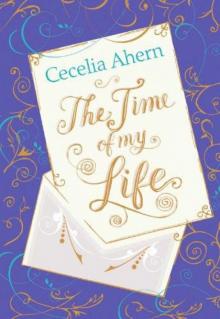 The Time of My Life
The Time of My Life Lyrebird
Lyrebird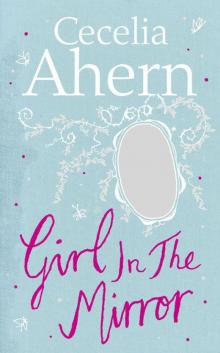 Girl in the Mirror
Girl in the Mirror Perfect
Perfect One Hundred Names
One Hundred Names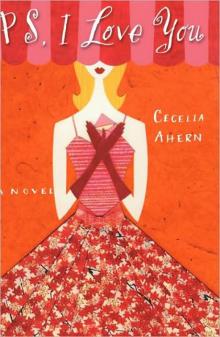 PS, I Love You
PS, I Love You Flawed
Flawed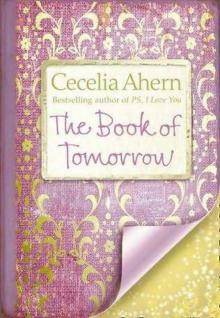 The Book of Tomorrow
The Book of Tomorrow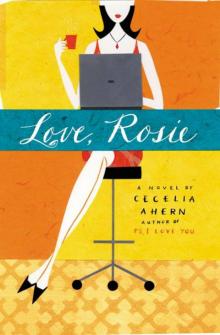 Love, Rosie
Love, Rosie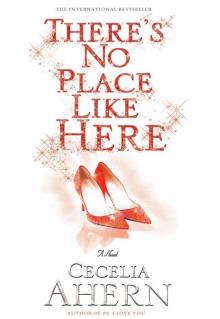 A Place Called Here
A Place Called Here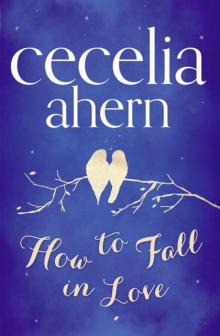 How to Fall in Love
How to Fall in Love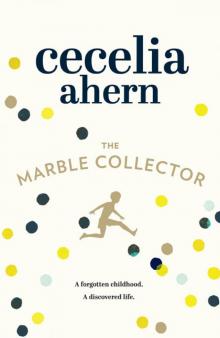 The Marble Collector
The Marble Collector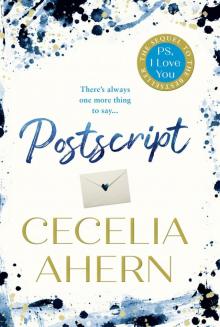 Postscript
Postscript The Gift
The Gift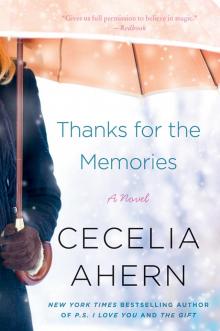 Thanks for the Memories
Thanks for the Memories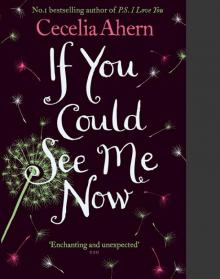 If You Could See Me Now
If You Could See Me Now Roar
Roar Cecelia Ahern 2-book Bundle
Cecelia Ahern 2-book Bundle Girl in the Mirror: Two Stories
Girl in the Mirror: Two Stories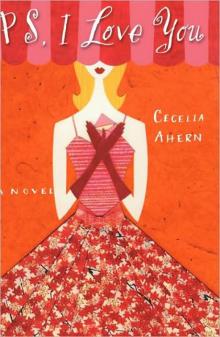 PS, I Love You: A Novel
PS, I Love You: A Novel Cecelia Ahern Short Stories
Cecelia Ahern Short Stories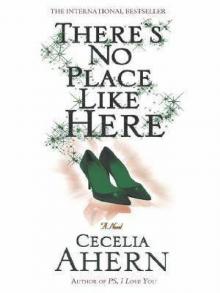 There’s No Place Like Here
There’s No Place Like Here